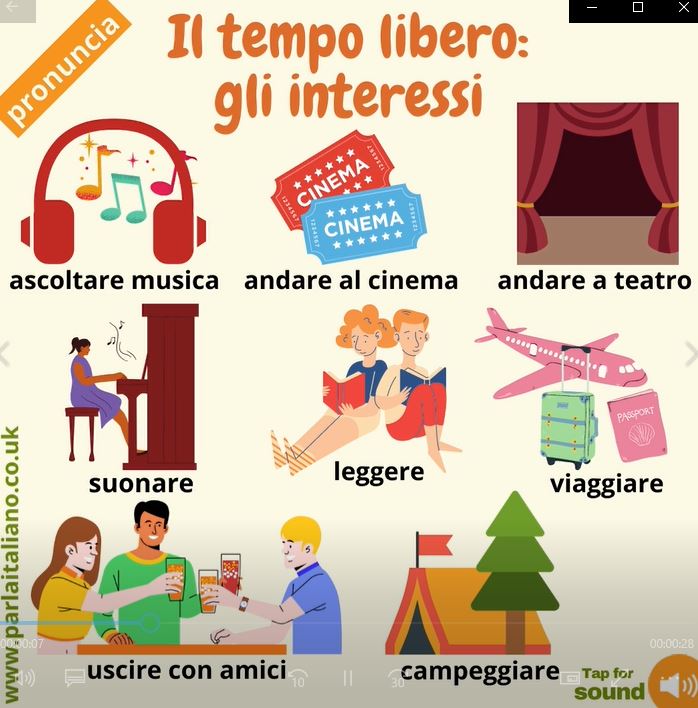Talking about hobbies and interests is a great way of starting a conversation in Italian, getting to know new people and make friends.
So, in this blog we’ll learn how to talk about hobbies in Italian, how to ask about somebody’s hobbies, how to say hobbies, interests and sports in Italian. Finally, we will put together an easy conversation starter that you can use straight away.
At the end, we will also teach you how to discuss preferences in an easy way, with the verb piacere. So, let’s start with learning:
5 ways of asking about your hobbies
-
- Cosa fai nel tempo libero? (What do you do in your spare time?)
-
- Cosa ti piace fare nel tempo libero? (What do you like to do in your free time)
-
- Quali sono i tuoi interessi? (What interests do you have?)
-
- Quali sono i tuoi hobby? (What are your hobbies?)
-
- Fai sport? (Do you do any sports?)
The word hobby in Italian
In Italian the word hobby is translated as passatempo, however, we commonly use the English word hobby. However, please note that Italians do not say hobbies but hobby. In Italian the word is not pluralised, but it used only in its singular form. In fact, all words adopted by the Italian language from foreign languages are only used in their singular version. So to say: ‘what are your hobbies?’ we say: quali sono i tuoi hobby?
So how do you answer the previous questions?
Here are some examples of simple conversations. The first one is related to sports (see below examples of sport vocabulary):
Cosa ti piace fare nel tempo libero?
Cucinare e fare giardinaggio = Cooking and gardening.
Here is another example of conversation, with a different question related to hobbies:
Fai sport? = Do you do any sport?
Sì, mi piace nuotare e correre = Yes, I like swimming and running.
And one more, this time related to interests:
Quali sono i tuoi interessi = What are your interests?
Nel tempo libero mi piace andare al cinema e viaggiare. = In my free time, I like going to the cinema and travelling.
Let’s see some vocabulary related to: sports, hobbies and interests in Italian:

To say “to play +sport” in Italian is giocare + a. Notice that giocare is followed by the preposition a.
So in Italian we say:
giocare a tennis = to play tennis
giocare a calcio = to play football
giocare a golf = to play golf
giocare a rugby = to play rugby
giocare a pallacanestro = to play basketball
giocare a hockey = to play hockey

Notice again that the verb giocare it is not used only to talk about a sport but for example cards.
giocare a carte = to play cards
giocare a Monopoli = to play Monopoli
giocare a scacchi = to play chess
giocare a dama = to play draughts/checkers

Also the verb andare (=to go) also wants the preposition a in the case of:
andare al cinema = go to the cinema
andare a teatro = go to the theatre
andare a ballare = go dancing
However, in other cases wants the preposition in as in:
andare in palestra = go to the gim
andare in piscina = go to the swimming pool
Prepositions in Italian need to be learnt by heart. A quick tip to learn preposition is to group them together in a little story that you can remember.
The expression: mi piace
Mi piace means I like and it comes from the verb piacere. However, it is not conjugated in the usual way. We are going to look at the verb in more detail in a future blog, for now though start using it as a phrase. Let me know if you are interested in our next blog by subscribing down below, so that you don’t miss out.
A grammar snippet: mi piace + infinitive
The expression mi piace is followed by the verb in the infinitive form, so you do not need to conjugate it.
So if I ask you:
Quali sono i tuoi hobby?
Can you answer using Mi piace…?
For example: Mi piace correre e dipingere.
The word e means and…







